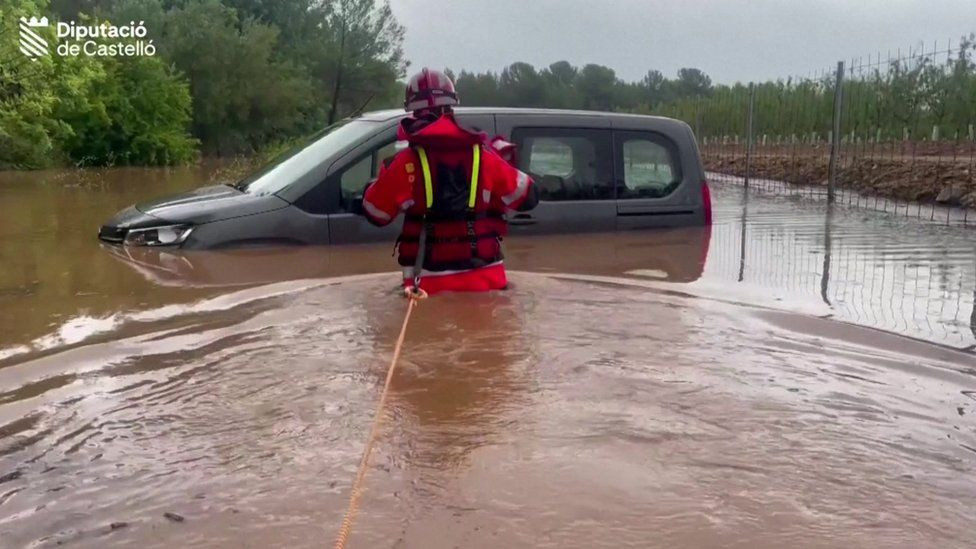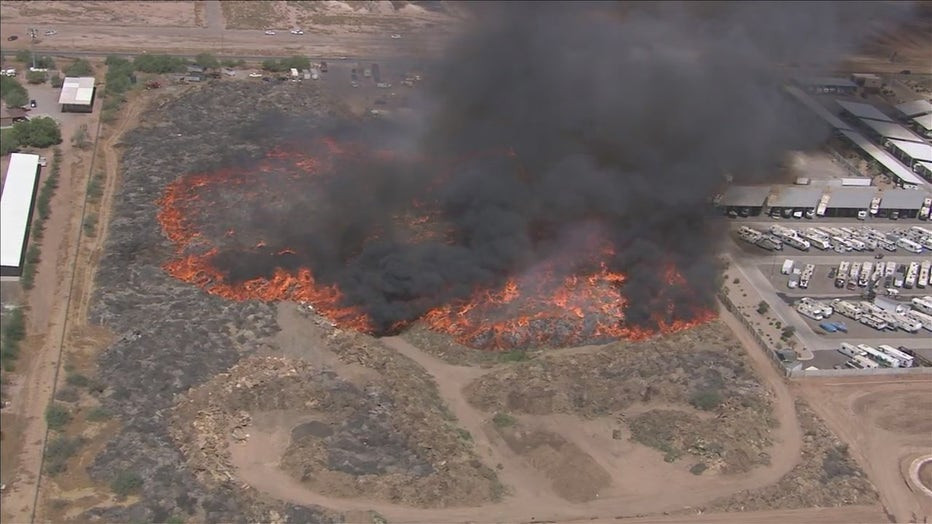Several bodies have been found after parts of southern and eastern Spain were hit by severe flash flooding on Tuesday, with some locations receiving up to 12 inches of rain in just a few hours. Footage from the city of Valencia showed mud-colored water flooding through the streets, tearing down walls, and sweeping away parked cars. Valencia’s regional leader Carlos Mazon told reporters early Wednesday that some bodies were found as rescue teams began to reach areas previously cut off by the floods. “Unfortunately, we can confirm that some bodies have already been found, but out of respect for the families we are not going to give any more details,” Mazon said. Spanish Prime Minister Pedro Sánchez said an unspecified number of people are missing due to the flooding, and asked citizens to act with “great caution” and avoid moving around if it is not necessary. The Spanish government set up a crisis committee on Tuesday, according to the Palace of La Moncloa. It will be chaired by Sánchez and, from Wednesday, will coordinate the work of the Civil Guard, the National Police, the General Directorate of Civil Protection, and the Military Emergency Unit. Extreme rain warnings were in effect on Tuesday for some areas including around Valencia, according to Spain’s Meteorological Agency, AEMET. These warnings called for the potential of 200 mm (4 inches) of rain in less than 12 hours. In some locations, the rainfall estimates were exceeded in even shorter periods of time. Chiva, which is east of Valencia, received 320 mm of rain in just over four hours, according to the European Severe Weather Database. The Valencia area averages 77 mm (3.03 inches) for the entire month of October. Flooding was also reported in and around Murcia and Malaga with over 100 mm (4 inches) of rain falling in some of these areas. A strong upper level low pressure is moving northward into the region from Africa. The strong system is bringing a significant amount of atmospheric instability to the region. Extreme amounts of rainfall are also being enhanced with moisture from the Mediterranean Sea and upslope flow into higher terrain which acts to squeeze out additional moisture. Rainfall warnings continue through Wednesday for portions of eastern and southern Spain, according to AEMET. The warnings north of Valencia are for rainfall totals in excess of 100 mm (4 inches) and rainfall rates of 30 mm per hour (1.18 inches per hour). Areas of southwestern Spain will see the threat of heavy rain continue through the end of the week. ## Devastating Impact of Flash Floods The devastating flash floods in Spain have left a trail of destruction in their wake, claiming the lives of at least 13 people and leaving several others missing. ### Impact on Transportation The floods have severely disrupted transportation in the affected regions, with roads being flooded and railway lines being disrupted. A high-speed train with nearly 300 passengers on board was derailed near Malaga, although rail authorities said no one was hurt. The high-speed train service between Valencia city and Madrid was interrupted as were several commuter lines. ### Search and Rescue Efforts Emergency services have been working tirelessly to rescue those trapped by the floods, using helicopters to lift people from homes and cars which were in danger of drowning. ### The Role of Climate Change Scientists have warned that increased episodes of extreme weather, like flash floods, or the wildfires seen elsewhere in Europe in the summer, are likely linked to human-driven climate change. Meteorologists believe the warming of the Mediterranean, which increases water evaporation, plays a key role in making torrential rains more severe. The Spanish government has set up a crisis committee to coordinate the work of emergency services and provide support to affected communities. As the clean-up effort begins, the focus will be on rebuilding infrastructure and providing assistance to those who have lost their homes and livelihoods. ## Looking Ahead While the immediate focus is on the aftermath of the floods, the long-term implications for Spain and other countries facing similar extreme weather events are concerning. The need for climate action is more urgent than ever before, as the impacts of climate change continue to manifest themselves in increasingly destructive ways. ## A Call to Action The events in Spain serve as a stark reminder of the vulnerability of our planet and the urgent need for global cooperation to mitigate climate change. It is time for governments, businesses, and individuals alike to take concrete steps to reduce greenhouse gas emissions and build resilience to the changing climate. Only through collective action can we hope to avoid future disasters and create a sustainable future for generations to come.
Luca Rossi
Environmental Reporter
Reporting on environmental issues and sustainability.
















